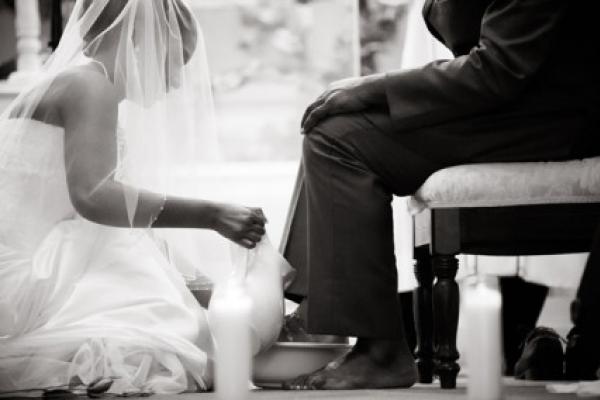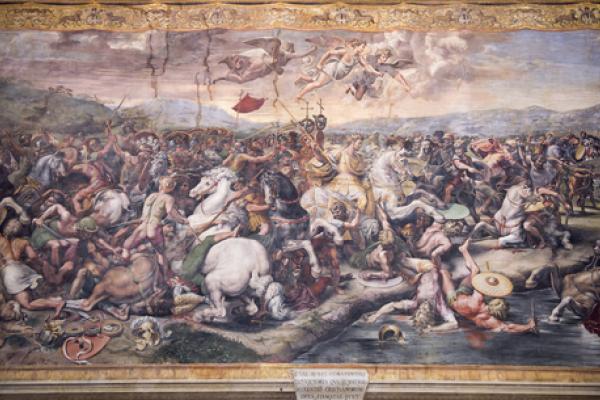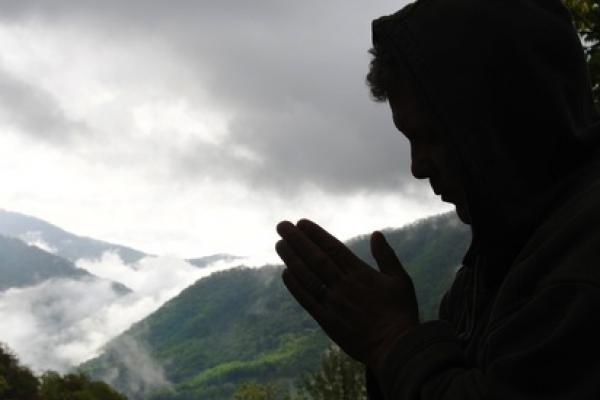He’s been crowned the “new hip-hop king” and his newest album, “Anomaly,” topped iTunes and Amazon charts the day of its Sept. 9 release. He’s been invited to birthday parties for both Billy Graham and Michael Jordan and riffed on NBC’s “Tonight Show” with host Jimmy Fallon.
It’s the kind of mainstream success that has eluded most Christian rappers. Then again, some people are still trying to decide if hip-hop star Lecrae is a Christian rapper, or a rapper who happens to be Christian.
It depends who you ask, including Lecrae himself.
“God has also raised up lowly, kind of insignificant individuals to do miraculous and incredible things,” Lecrae, 34, said in an interview. “We’re the Gideons, we’re the Davids. Even Jesus himself made himself of no reputation. It’s when you can link it back to God doing it, I think that’s what he loves. He’s not a megalomaniac, he’s deserving of glory and honor, and to use individuals that demonstrate that it was him, and him alone, it accomplishes his mission and that’s success.”
When Brianna and Chris Lindsay married in June, they had the church, the minister, the bridesmaids … and a foot-washing ceremony for the bride and groom.
It was, they said, a sign of their mutual submission.
“First he took off both of my shoes and we had a water basin and pitcher,” said the bride, recalling the five-minute ceremony during which a friend read a poem about the couple. “In return, I got down in my dress, took off his socks. … It probably was a little awkward for us — maybe a little — but we felt like it was an important message to show people.”
In an age of big-ticket destination weddings and reality show “bridezillas,” some evangelical Christians are opting for what writer Catherine Strode Parks calls “A Christ-Centered Wedding.”
Her new book details ways brides and grooms can fill their wedding with biblical touches to reinforce for friends and family the centrality of their faith.
“If we really believe that marriage is important, that it matters and that God infused it with so much meaning, then we want to share that joy with those who are present and invite them into that celebration and that worship,” said Parks, who co-wrote the book with her mother, Linda Strode.
Whether ISIS is "Islamic," or a "state," it is definitely terrifying. As it terrorizes the Levant — killing Muslims, Christians, Jews, Yazidis, and other religious/cultural minorities in Syria and Iraq — and takes the lives of Western journalists, it strikes fear in the hearts of many.
Swirling around the alarming analysis are the rumors and realities of individuals from Europe and the U.S. joining the ranks of ISIS and fighting for their "cause."
The intelligence organization Soufan Group recently released a report stating that fighters from at least 81 countries have traveled to Syria since its three-year conflict began. Hundreds of recruits come from nations like France, Germany, the UK, and the U.S.
Of all the fearful intimations of this conflict, this feature seems to be the most frightening to many in the West. Could it be that my neighbor is a secret jihadi? Are redheads (a "pure" European stock) more prone to terrorism? Are mosques their hideouts? Regardless of the judiciousness of these questions, underlying them all is the question "why?" Why would someone leave the West to fight for ISIS in Syria and Iraq?
According to the Soufan report, those that leave for the Middle East to fight are typically 18-29 year-old men (some as young as 15) and some Western women who join with their spouses, or come alone to become "jihadi brides." These men and women are Islamic, often second or third generation immigrants, though very few have prior connections with Syria.
Why do they join? Is it religious devotion? Psychological imbalance? Tendency toward radical movements and anarchy? All of these motivations may play a part, but my argument is that these men and women who leave their Western homes for the dunes of terror are lonely.
These Western jihadis are isolated — that is why they join ISIS.
Never heard of Michaelmas? Neither had I, until I read the recipe for struan in Peter Reinhart’s Brother Juniper’s Bread Book: Slow Rise and Method as Metaphor. The ancient Celts baked struan, bread made with harvested grains, for Michaelmas. The day was a locavore feast. The more I researched Michaelmas, the more I realized this largely-forgotten holy day could be the day for urban churches to connect with the land.
What if on the weekend before Michaelmas churches offered locally harvested/sourced meals? What if churches imagined Michaelmas as the day to lift up compassionate and sustainable agriculture practices as part of its mission? What if churches offered Michaelmas as the holy day for urban populations to reconnect with the land and rhythms of life our ancestors intuitively knew?
Like most religious holy days, Michaelmas originated as an agricultural observation. The ancients Celts celebrated the last harvest after the equinox with bread, poems, songs, dancing, and feasting. To the protector of the harvest, Saint Michael the Archangel, they offered prayers and incantations.
This week, deepen your relationships by going to your local farmers’ market and filling up your basket. Then invite over friends, family, neighbors and soon-to-be friends over for a local feast. Bake a loaf of struan (recipe here and below), write a blessing, place some “Michaelmas daisies” (or asters, or any local flowers) on your table, say thanks to those who nurtured the land, and have a joyous local Michaelmas meal.
We met over email in the spring of 2012. I had just co-launched a literary blog and our mutual friend introduced us as fellow writers. Stephanie and I immediately hit it off. Not only was she a gifted writer, Stephanie and I shared a similar sense of humor and sensibility. As we got to know each other and began to write with each other, we discovered a ridiculous number of similarities and common points of interest, including and especially, our shared Christian faith. To paraphrase C.S. Lewis, it was as though every other email was a “you too?” moment.
Then one day I wrote a piece that indicated my progressive political leaning. The 2012 presidential election was heating up and though the piece was not overtly political, it revealed my beliefs. Stephanie, it turned out, was a conservative.
This news wasn’t really a big deal to me — I am used to have friends and family who have different political beliefs, and I even got my first start in the blogging world as the token “progressive” Christian through a conservative friend’s blog. But things were getting heated with the election and we didn’t know each other that well.
Stephanie and I began to email back and forth about politics through the lens of faith, which tested whether we were Christians or ideologues first. We shared two things in common in holding our different political beliefs because: 1) we had both thought a lot about them, and, 2) shockingly, neither of us had an interest in destroying America. Eventually Stephanie and I decided to co-write a bipartisan series for our website, looking at partisanship through the lens of faith (summary: love for Jesus makes for fertile common ground).
After the election it was hard to ignore the mix of apocalyptic expressions of woe and the tone-deaf exclamations of victory. Each came with its own vilification of the other party. I found myself at parties with fellow progressives defending conservatives because the caricatures of them were plainly wrong, and I would be hurt if Stephanie didn’t defend me against caricatures of progressives.
It’s no secret that the prison population in the United States has exploded in recent decades. We incarcerate our citizens at higher rates than any other developed nation. The federal prison population has increased by almost 790 percent since 1980. The number of children with one or more incarcerated parents has increased at an astonishing rate of 80 percent since 1991.
The mass incarceration of mostly Black and Latino men and women has moral implications in two ways. First, our current “tough-on-crime” approach to criminal justice has cost taxpayers a substantial amount with little effect on crime rates. These tax dollars could be spent instead on education, mental health, or drug rehabilitation. The way we spend public money reflects our public values. (Sound familiar?)
In addition, there are far-reaching moral implications of the act of naming someone “criminal." This label is inhumane, unjust, and unholy.
The “criminal” label has devastating effects on quality of life and equality of opportunity for many individuals. It is nearly impossible to shake. Most federal education grants are not available to someone with a criminal background. In many cities, access to subsidized or public housing is banned based on arrests or incarceration. Many states ban those with criminal backgrounds from food stamp eligibility. Being forced tocheck the box on an employment application indicating a past felony conviction essentially lands that application in the trash. The Sentencing Project estimates a total of 5.85 million people have been banned from voting because of a past conviction.
But Christians have a unique, biblically-based perspective on labels. In Christ, “sinners” become “beloved ones." The excluded, hated, and oppressed become included, wanted, and loved.
Christ-followers are given another angle of vision, another mirror into our souls, in the person of Jesus Christ. No passage of Scripture points more acutely to this image than one of this week’s lectionary texts: Philippians 2:1-13. The Apostle Paul invokes the Christ hymn as a means of reminding us who we are called to be. He urges his readers to “be of the same mind” and to “have the same love” as the one who’s image they bear. Put simply, Jesus-followers are called to participate in a selfless, humbling, even self-emptying mode of being in the world.
How then ought Christ-followers respond to the religiously-inspired violence perpetrated by groups like ISIS/ISIL? I believe that Christ-followers, while denouncing all forms of violence—especially religious violence—ought to respond with compassion and sympathy.
We are able to move toward compassion and sympathy when we are able to articulate religious violence according to broader historical, geopolitical, and theological modes of analysis. What we require is something beyond bland appeals to ethical imperatives or capitulation to the rhetoric and presuppositions of religious extremists. We need a way to traverse the gulf that separates demonization from compassion, hatred from love.
My thinking about religious violence is sharpened by the work of my friend and mentor Ted A. Smith. In his forthcoming book, Weird John Brown: Divine Violence and the Limits of Ethics (Stanford University Press), Smith articulates a moral vision fueled by practical reason beyond that which is captured within an “immanent frame of causes and effects.” Smith writes explicitly to the concept of divine violence, which is a type of violence that claims some kind of immediate relation to that which is counted as holy, sacred, or ultimate. In light of Smith’s astute analyses, and following the model established by Christ Jesus, we may call Christians to a particular kind of understanding in the face of religious violence.
A Hymn for This Sunday
This hymn by Carolyn Winfrey Gillette asks the question what does it mean to be a Christian, a church? Whom do we serve? How shall we respond to those in need? It is based on the lectionary passage Matthew 21:23-32 (September 28, 2014). The United Methodist Worship Office has formatted the hymn with the music as a free download.
Once a Father Told His Children
NETTLETON 8.7.8.7 D (“Come, Thou Fount of Every Blessing”)
Once a father told his children,
“Go and do your daily chores.
Go and work out in my vineyard;
All that’s mine will soon be yours.”
One responded, “I won’t do it!”
Then he changed his mind and went.
One said, “Yes! Just send me to it!”
But he went back home again.
...
We all know that the world is moving down a very dangerous path, and that we must reverse our direction. But so far, the credible and persuasive scientific case hasn’t accomplished that. Sensible economic proposals haven’t halted that direction either. And smart political arguments have yet to reverse our course either.
Why? Because we are addicted to fossil fuels. The results are planet-threatening climate change and people-threatening terrorism.
We need conversion. Nothing less. Only our conversion could change our dangerous direction.
Two fundamental things could bring the kind of conversion we need.
One, our faith.
Two, our children.
I write this essay on the eve of a US led air campaign that marks “the biggest direct military intervention in Syria since the crisis began more than three years ago.” There is no denying that ISIS/ISIL has captured the attention of the world through its religiously inspired acts of violence. The atrocities committed in recent months by ISIS/ISIL have left countless people of faith—including many devout Muslim leaders across the world—speechless.
Yet, one of the central aspects of religiously inspired violence is that it rails against silence. Whether it is Christian violence in Nigeria and Uganda, Hindu violence in Western India, Jewish violence in Gaza, or Islamic violence in Indonesia and Syria, acts of terror demand denunciation. The ubiquity of religiously inspired violence across cultures and religious traditions lends credibility to the belief of some that religion itself is the problem. My own Christian tradition treats our inclination to harm and even kill one another as symptomatic of our fallen natures; it is a mark of our propensity to evil. This is what makes religious violence so pernicious: it twists our one remedy so that it exacerbates the disease.
Violence—whether it arises out of a Quentin Tarantino film or a YouTube video of decapitation—captures our attention. Even as we are repulsed by the scope of human depravity, such acts of violence consume our attention. Scenes of violence are like a mirror into the darkest parts of our soul: we cannot bear the images we see, but neither can we turn away.









